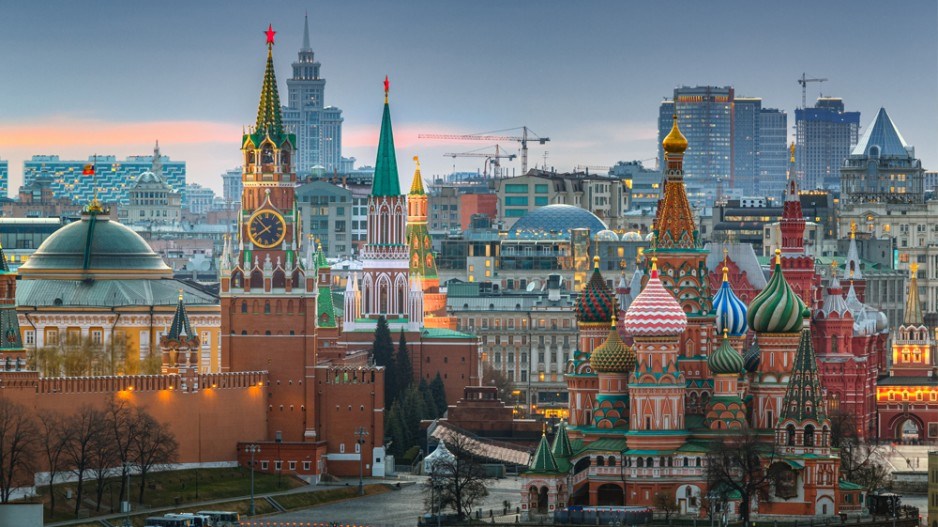Canada and Russia have a few things in common. Both are vast, northern countries rich in natural resources, and both are major exporters of key commodities like oil, natural gas, lumber, minerals, metals, potash and wheat.
But in Europe, the U.S., Japan, South Korea and several other countries, Russia is now a pariah, and many of the products Canada produces may suddenly gain a political premium.
“I think there’s no question there is a premium,” said André Powell, managing partner at Deetken Insight, a Vancouver management consulting firm. “These events have underscored the importance of countries having diverse sources of supply, and sources of supply that are reliable and dependable and morally aligned to their own values.”
Hakan Ekstrom, president of Wood Resources International, predicts some dramatic shifts in wood markets and trade to result from sanctions imposed on Russia.
“Increased sanctions against trading with Russia and difficulty with financial transactions will probably interrupt and redirect shipments of forest products throughout the world,” he wrote in a recent brief.
“In the shorter-run, the boost to base metals, forestry and agricultural products prices following the Russia-Ukraine conflict should support the bottom lines of companies that produce those commodities, as well as the value of Canadian exports,” said Marc Desormeaux, commodities analyst for Scotiabank Economics.

“However, the conflict should also exacerbate existing supply chain issues and inflationary pressures and create greater uncertainty, which are likely to add to firms’ costs and weigh on commodities demand.”
While China may absorb some Russian exports that might otherwise go to Europe or Japan, Ekstrom thinks Russia’s forest industry could enter a long-term decline.
“At least short-term, Russia will have a huge problem exporting almost anything to the West,” Ekstrom said. “That would include, of course, a lot of forest products going into Europe, some would go to Japan.”
Longer term, Russia’s forestry industry could decline in much the same way that Venezuela’s oil industry did, because it may have trouble financing new mills or buying new machinery and equipment, most of which is made in Western countries.
“They have the trees – they just don’t have the capacity to bring out those trees to manufacturing facilities,” Ekstrom said. “They just started to invest or give financial incentives to the industry to spend a lot of money to expand. And that’s going to come to a halt now.
“Even if [Vladimir] Putin decides that the Russian banks should try to continue to give money to investors, those investors have nowhere to go because they don’t have the machinery, the scanners, the optimizers, the electronics.
“Most of that is not produced in Russia, so they have to go to Germany, to Finland, to Canada, to Sweden to buy the equipment, but they can’t do that with the financial restrictions that are now in place for moving money between buyers to sellers.”
Western governments aren’t the only ones imposing sanctions on Russia. Some private companies are too. Orsted AS, a Danish power utility, for example, said it will stop buying Russian coal and biomass.
Biomass includes wood pellets burned as an alternative to coal in thermal power plants. B.C. has increasingly become a major producer of wood pellets, so that is one sector that could benefit from new customers and-or higher prices.
“With Europe losing Russia, they might be willing to pay more for pellets wherever it is in the world, and B.C. is one of the few places outside the U.S. south that can produce large volumes of pellets,” Ekstrom said.
With B.C.’s timber supply declining, the province’s lumber producers might not be able to ramp up production to service increased demand in places like Europe and Japan. But they might at least see sustained high prices for their lumber.
Producers in Sweden and Germany could end up supplanting some of what is lost from Russia in Europe, which might mean fewer exports to the U.S. and higher demand and prices for Canadian lumber in the U.S.
“There will kind of be a ripple effect that’s going from Russia to Europe to U.S. to Canada,” Ekstrom said.
There may also be sustained high prices for pulp and paper.
“There might be more opportunities for Canada to move more pulp to Europe, if needed,” Ekstrom said. “This also could mean that pulp prices will continue to be pretty high, which is obviously good news for pulp mills in Canada.”
As for minerals and metals, both Russia and Canada are significant producers and exporters of potash, nickel, aluminum and gold. Last week, in response to western sanctions against Russia, nickel prices surged 30%, gold prices hit US$2,068 per ounce (a near record) and aluminum prices were at or near record highs.
Some analysts have been predicting a supercycle for base metals, rare earths and other critical minerals and metals, driven by the push to decarbonize.
The uncertainty over the supply of certain metals and minerals from Russia may amplify and prolong that cycle, although some analysts also warn that the commodities bull market could be tempered by a general global economic slowdown, as high prices and inflation take the steam out of the post-pandemic recovery.
Longer term, western governments may be forced to think about mining in terms of national and economic security.
Western countries have failed to secure their own domestic supply of certain critical metals and minerals, and now find themselves dependent on China for rare earths and on Russia for commodities like tungsten and palladium.
“This is a supply chain that’s crashing to reality,” said Lewis Black, CEO of Almonty Industries (TSX:AII), a Toronto-headquartered company with tungsten mines in Spain and Portugal and under development in South Korea.
Like rare earths, tungsten is rare. The “super alloy” is used in aerospace, electronics and munitions. Tungsten is used in armour-piercing shells, for example, and therefore important to the defence industry. China, Russia and Vietnam are among the world’s top tungsten producers.
“Your entire manufacturing – the nuts and bolts of that manufacturing – is essentially in the hands of political structures that do not share the same values as North America,” Black said. “Building a mine in China or Russia is a much simpler undertaking. If the state wants it, it happens, whereas in Canada or the U.S., it’s really – soups to nuts – 10 years. •




